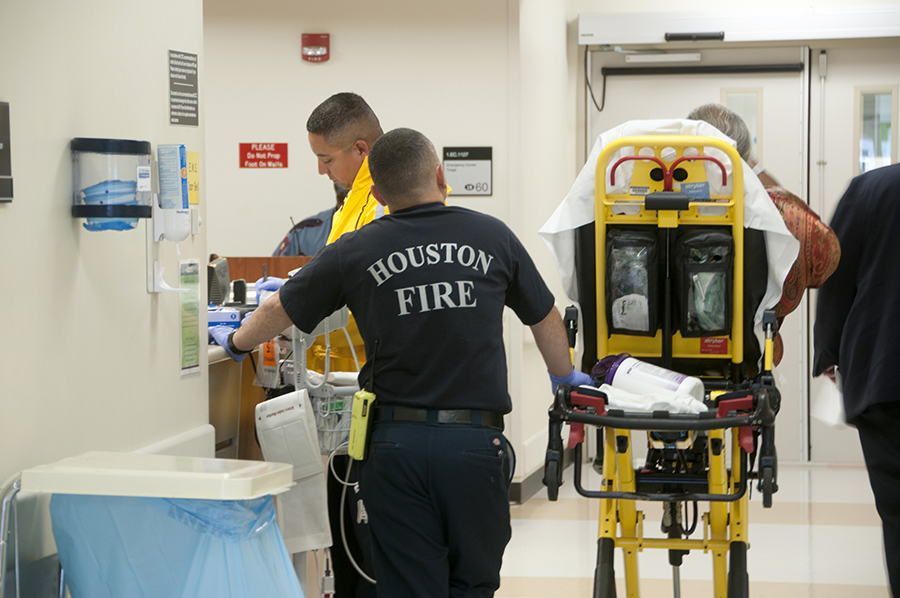Emergency Medicine research helps mitigate disparities in access to life-saving care

The connections between health and disparities are increasingly coming into focus, with two recently published papers from the Department of Emergency Medicine’s Texas Emergency Medicine Research Center.
Both retrospective studies review disparities in access to life-saving cardiac resuscitation in Texas hospitals, examining data from the Texas Cardiac Arrest Registry to Enhance Survival (TX-CARES) – a registry run by McGovern Medical School’s Department of Emergency Medicine and populated by EMS agencies and hospitals from across the state.
“Race and Ethnicity Disparities in Post-Arrest Care in Texas,” published in the April 8 issue of Resuscitation, evaluates the association between patient race/ethnicity and provision of post-arrest care in Texas using the TX-CARES data from 2014-20.
Out-of-hospital cardiac arrest occurs in more than 350,000 people a year and is a leading cause of death and major public health problem in the United States. However, little is known about the care that minority patients receive in the hospital.
The study stratified the out-of-hospital cardiac arrest data by race/ethnicity and measured post-arrest procedures linked to outcomes, such as targeted temperature management, percutaneous intervention, early withdrawal of life-sustaining therapies, survival to discharge, and survival with good neurologic outcome.
“While bystander CPR and AED use represent important links in the chain of survival, post-arrest care in the hospital is also crucial for improving outcomes among minority out-of-hospital cardiac arrest victims, and that is what we are looking at in this study,” said Ryan Huebinger, MD, corresponding author and assistant professor of emergency medicine.
From analyzing 8,363 out-of-hospital cardiac arrest patients, researchers found Black patients had both lower percutaneous intervention and survival with good cerebral performance category. Hispanic/Latino patients had lower targeted temperature management, survival, and survival with good cerebral performance category. However, after adjusting for clustering by receiving hospital, most of the post-arrest care relationships were negated, and Black patients actually had a higher rate of targeted temperature management. Inter-hospital post-arrest care disparities may exist, said the authors.
“Further understanding these disparities is paramount to delivering equitable resuscitation and improving outcomes for these vulnerable populations,” Huebinger added.
In “Socioeconomic Status and Post-Arrest Care after Out-of-Hospital Cardiac,” e-published in Resuscitation ahead of print, Huebinger also was the corresponding author, evaluating the association between neighbor socioeconomic status and post-arrest care in Texas using the TX-CARES registry.
In this retrospective study, the records of 9,346 out-of-hospital cardiac arrest cases were evaluated, considering their neighborhood socioeconomic status, post-arrest targeted temperature management, percutaneous coronary intervention, and outcomes. Researchers pulled socioeconomic and demographic information from 2,119 U.S. census tracts, calculating the median household income, employment rate, and high school graduation for each area.
Researchers found that lower income, education and employment were all linked to lower rates of targeted temperature management, and lower income was linked to lower rates of percutaneous coronary intervention. However, these associations did not exist when adjusting for receiving hospital, suggesting that hospitals that care for poor patients may provide worse care after cardiac arrest.
“Through the identification of care disparities and implementation of quality improvement initiatives, state and local entitles can improve care and outcomes for out-of-hospital cardiac arrest patients,” Huebinger said.
The Texas-CARES Program www.tx-cares.com is a statewide out-of-hospital cardiac arrest registry and quality improvement initiative run by the Department of Emergency Medicine and is aimed at measuring and improving survival from cardiac arrest in Texas.